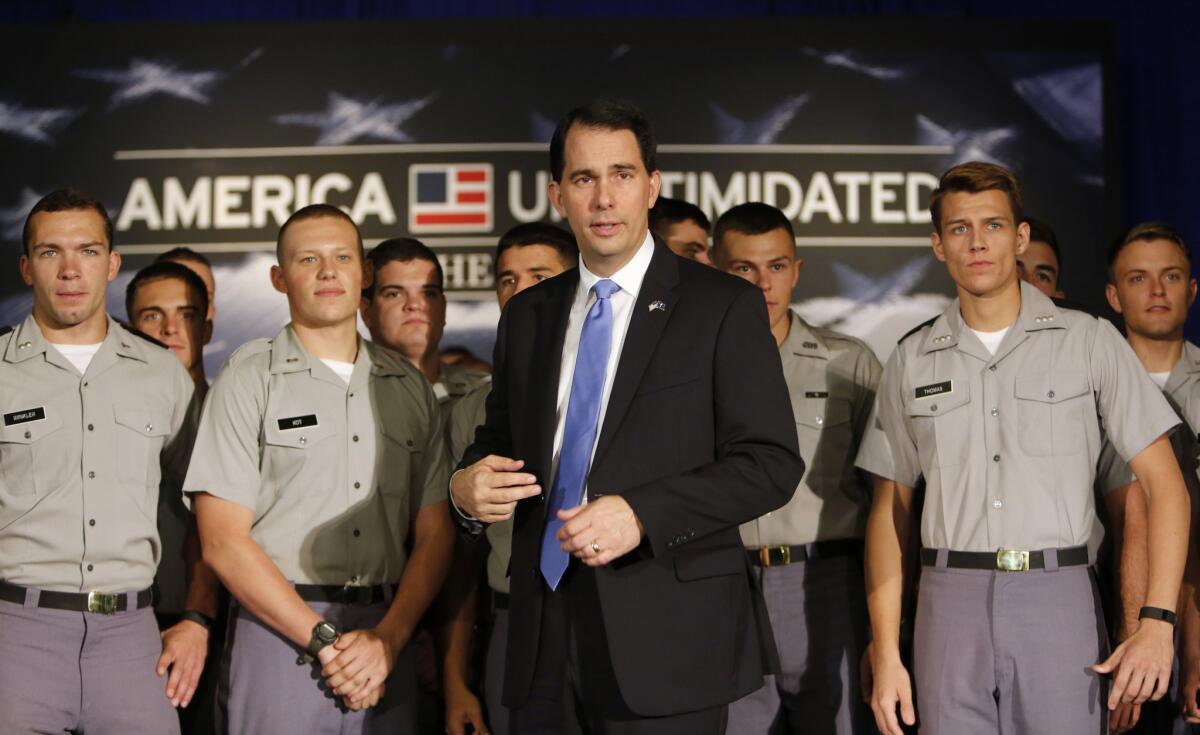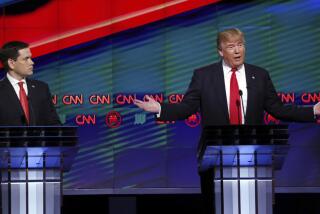Scott Walker and Marco Rubio attack Obama -- and Clinton -- on foreign policy

Wisconsin governor and Republican presidential candidate Scott Walker stands with cadets Friday after giving a foreign policy speech at the Citadel in Charleston, S.C.
Reporting from Washington — Wisconsin Gov. Scott Walker and Florida Sen. Marco Rubio accused the Obama administration of abdicating American leadership in back-to-back foreign policy speeches Friday intended to put their presidential campaigns back in the national conversation about next year’s election.
Though Rubio focused on China and Walker on the Middle East, they shared many of the Republican critiques directed at President Obama and his former secretary of State, Hillary Rodham Clinton, the front-runner for the Democratic nomination. The men spoke a few miles from each other in Charleston, S.C., an early primary state, where each has struggled in recent polls as Donald Trump builds on his lead in the Republican field.
Walker, who has attempted to channel some of the anger that has fueled Trump’s campaign and position himself among the most conservative presidential aspirants, delivered the more visceral attacks. He spoke several times of his anger and invoked the U.S.-led bombing campaign in Libya in 2011 and the 2012 attack in Benghazi, Libya — which left four Americans dead — characterizing Clinton’s conduct as “outrageous.”
“Hillary Clinton pushed for the war in Libya,” he said. “Then she stood by the caskets of Christopher Stevens, Sean Smith, Tyrone Woods and Glen Doherty — she stood by their caskets — looked into the eyes of their parents and pointed to a YouTube video [that] she knew — she knew — was not the cause of their deaths in Benghazi.”
Walker, speaking at the Citadel military college, concluded that “everywhere in the world that Hillary Clinton has touched is worse off today than before she and the president took office.”
He outlined an aggressive foreign policy that would leave the door open to expanded military options against the group known as Islamic State. And though he did not call for a ground war, he said restrictions against troop advisors in the region must be lifted “and all other options should remain on the table.”
“We need to stop micromanaging the military and broadcasting our limits to our enemies,” he said.
Walker also said his policy would include overturning the multinational Iran nuclear deal and securing the U.S. border with Mexico “at any cost,” asserting that “Islamic extremists and other terrorists are most likely using the same trails into our homeland as the drug cartels, weapons smugglers and human traffickers.”
Walker has long faced scrutiny about his foreign policy readiness, as he has not held office outside of Wisconsin and at times has stumbled over questions in unscripted venues. He has said his experience fighting labor unions in Wisconsin has made him a stronger leader, a quality that would translate to the global stage. Friday, he did not explicitly mention the union fight, but alluded to it.
“I have been tested like no other candidate in this race,” he said.
Both he and Rubio also promised more military spending, blaming Obama for a decline in military readiness.
Walker did not discuss China in depth. But in recent days, he has called on Obama to cancel an upcoming state visit by Chinese President Xi Jinping.
Rubio, though his speech was a forceful rebuke of China’s leaders, stopped short of that.
“I also do not believe that we should be rolling out the red carpet for him,” said Rubio, speaking before the Charleston Metro Chamber of Commerce’s World Trade Center. “This is an opportunity to speak bluntly to an authoritarian ruler, not to treat him to a state dinner.”
Rubio’s worldview has been shaped by his upbringing in the cradle of Miami’s anti-Castro Cuban exile community, the son of immigrant parents who left the country before Fidel Castro came to power. He spoke of China in similar terms: as a meddling threat to American interests with a terrible human rights record that
includes tearing down churches, forced sterilizations and imprisonment of dissidents.
“Systems of government built on repression — they’re like houses built on sand,” he said. “The fragile social foundations of the Chinese economy are one reason for the [financial market] crash we saw this week.”
Under Xi’s rule, he said, “China has intensified its campaign to push America out of Asia.”
“China is doing everything it can to make the 21st century a Chinese century,” he added.
He accused Obama of appeasing the Beijing government and promised to increase the size of the U.S. military, speak out more on human rights, and increase military and economic ties with regional allies.
He supports completing the regional trade agreement known as the Trans Pacific Partnership, though he did not mention that the Obama administration had negotiated the deal. Clinton, who assisted during earlier negotiations, has not endorsed it.
Rubio spoke out against a trade war. “I would respond to China’s economic misconduct not through aggressive retaliation, which would hurt us as much as them, but by reinforcing our insistence on free markets and free trade,” he said.
Rubio, who sits on the Senate Foreign Relations Committee and is more experienced in unscripted foreign policy discussions than Walker, also took questions from the audience through a moderator. He said his insights in foreign policy had consistently been correct.
“If I am our party’s nominee, Hillary Clinton will not be able to lecture me on foreign affairs,” he said.
Asked about Russia, Rubio used some of his strongest language, calling its president a “gangster.”
“There’s no other way to describe Vladimir Putin,” he said, adding that the Russian leader’s political adversaries wind up poisoned or “shot in the street.”
noah.bierman@latimes.com
Twitter: @noahbierman
More to Read
Get the L.A. Times Politics newsletter
Deeply reported insights into legislation, politics and policy from Sacramento, Washington and beyond. In your inbox three times per week.
You may occasionally receive promotional content from the Los Angeles Times.











